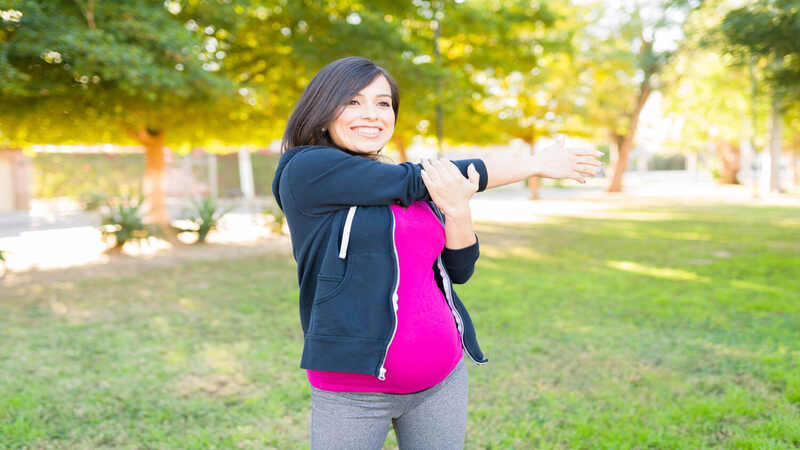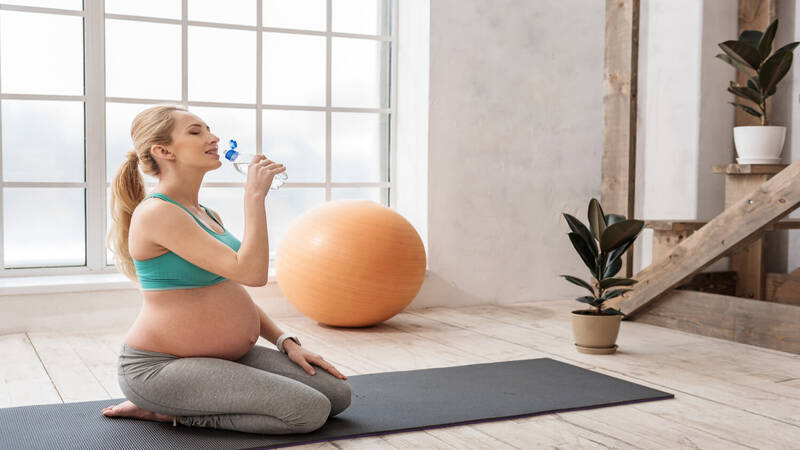
Though pregnancy is the time during which you should not over-exert your body yet, it is definitely not the time when you should just stay in all the time in bed. It is important to keep yourself busy with some physical activities. If you exercise, it is even better. Fret not, working out will not cause any harm to your growing baby. But you have to follow a few simple tips to exercise safely during pregnancy.
Of course, exercising during pregnancy doesn’t mean that you go for tedious cardio routines and vigorous exercises which you would otherwise do to lose weight but light exercises that will help you keep healthy. In this post, we will discover the best tips for exercising during pregnancy to help you unlock the most benefits.
Top 10 Tips to Exercise Safely in Pregnancy
Exercising will give you relief from back pain and swelling related to pregnancy (1). Further, exercisingExercising will also help you with labor and birthing,and plus will keep you energized and in high spirits. Since the old concept has been fading away that ladies should just put their feet up and rest all day, fitness instructors have researched and come up with various exercises that one can do without causing any harm to the baby. However, whenever you are doing exercises you should keep the following things in your mind to ensure the exercises you are doing areis not causing any harm to your health.
1. Consult Your Doctor

First and foremost, before starting any exercise you should consult and update your doctor about it. In most cases, if you have been working out on a daily basis from before pregnancy then chances are that your doctor will probably advise you to continue the same routine with a few tweaks here and there (no weights, or heavy cardio, for instance).
If you have never worked out before then you should take proper guidance from your doctor as to which exercises you should do in particular and how. Taking a slow but steady approach is the key, and make sure your fitness regime poses no threat to you or the baby.
[Read: When NOT To Exercise In Pregnancy?]
2. Eat Healthy Food Rich in Calories

As it is not only you who is dependent on your body’s calories, you need to take in sufficient calories to make up for the ones you lose while working out. This will ensure that your baby is not deprived of the required amount of calories from your body. At the same time taking in calories doesn’t mean that you start gorging on unhealthy fatty items. The calories you take in should be from a healthy source like dairy products. It’s better to have a balanced diet rich in vitamins, fibers, carbohydrates, and other essential nutrients to replenish your body (2).
3. Exercise Caution

When you are pregnant, you’d be advised to keep yourself from getting involved in any activity thatwhich might throw you off balance. Many expecting mothers love to ski, horse rid,e and even mountain bike. Avoid these kinds of activities. Enlighten yourself with the fact that in the course of pregnancy, your muscles and joints tend to become loose and tender. In such conditionscondition, a fall may threaten to tear off ligaments or damagebreaking of bones which you should absolutely avoid.
Pregnancy makes you more susceptible to sprains and injury from falls, all thanks to the increased levels of the hormone relaxin that loosens all ligaments and joints, especially in the pelvic region. Hence, it’s important to take care of yourself while exercising.
4. Wear the Right Shoes and Clothes While Exercising

You might have mild swelling in your feet so make sure you get the right size of shoes that gives you that extra room for your swollen feet. Dress up in a such a way that you can take off a layer once you have warmed up a bit. Not to forget the right maternity bra that gives you proper support. Breathable, loose-fitting, and comfortable fabrics without much ado should do well.
[Read: How to choose pregnancy shoes during pregnancy]
5. Warm Up

Warming up before you go for heavy routines which are bound to stress you out a bit is a huge must when you plan to exercise during pregnancy. Taking it slow will make it easier for the baby to adjust its heartbeat and pulse rate accordingly. A quick warm-up will prepare your body both mentally and physically. It will reduce the risk of injuries and enhance performance (3). On the other hand, cooling down will relax your body and boost recovery.
6. Drink Lots of Water

At any point in your exercise routine, keep your body hydrated. Not drinking enough fluids will result in increasing your body temperature which is harmful to both you and your baby. Lack of water can cause dehydration which can prove to be detrimental to your and the baby’s health. Further, drinking enough fluids during pregnancy may help in managing common pregnancy issues such as constipation (4).
7. Avoid Lying Flat on Your Back

You should take care of this, especially after your first trimester. Lying flat affects the flow of blood to the uterus (5). Make a point to keep a pillow under your hip when you lie flat. It will keep your Vena cava from getting suppressed. This will maintain the blood flow to the uterus and in the body to keep dizziness at bay.
8. Don’t Stand in One Place For a Long Time

This might affect the flow of blood to the Vena Cava thus causing the blood to pool in your legs, where your uterus blood supply could decrease (6). This can make you feel dizzy. Keep walking or shifting your weight from one leg to the other.
[Read: Standing For Long Hours In Pregnancy]
9. Do Not Over-Exert

Remember you are pregnant so, don’t over-exert yourself iIf at any point your current any position hurts you, stop immediately and don’t try that position ever again. Anything that seems uncomfortable, or makes you feel something is wrong is not supposed to be carried on. Take a break, and do not push yourself too hard.
10. Rise Up Slowly

While doing exercises that require you to lie on your back, get up slowly and carefully. Once you have gone past your first trimester and your tummy starts to grow, your center of gravity shifts, and you have to be extra careful while changing positions.
If you are really aiming for a natural birth then you should definitely go for light exercises during pregnancy keeping in mind the above-mentioned points. These tips to exercise safely during pregnancy can help you enhance your pregnancy journey and will ensure your health. However, it’s good to seek professional guidance, if you have any doubts.
Have a healthy pregnancy.
Read Also: Top 10 Benefits Of Staying Active During Pregnancy
FAQs
1. Can I Do Squats While Pregnant?
Squats are a great resistance exercise to keep your hips, glutes, core, and pelvic floor muscles strong and flexible while you’re pregnant. When done correctly, squats can help improve your posture, and they might even help you give birth.
2. Is Jumping OK While Pregnant?
During pregnancy, it’s best not to bounce, jump, or do other high-impact activities too much. Even if they were used to jumping, some women might be able to keep doing them well into the second trimester, while others might need to stop in the first trimester.
3. When Do You Stop Bending During Pregnancy?
Most of the time, bending over while pregnant won’t hurt the health of either the mother or the baby. The fluid around the fetus, called amniotic fluid, acts as a shield to keep the baby safe. Experts say that you shouldn’t have any trouble bending while you’re pregnant as long as you do it the right way. It is always better to bend at the hips than at the back or knees.
4. What Month Should A Pregnant Woman Start Exercising?
During your pregnancy, you can start working out at any time. This is especially true for women who worked out before getting pregnant. You can keep going if you were very active before you got pregnant and you are still healthy. If you don’t usually work out, start with something easy like walking.
References
- Effects of Conventional Exercises on Lower Back Pain and/or Pelvic Girdle Pain in Pregnancy: A Systematic Review and Meta-Analysis
https://www.ncbi.nlm.nih.gov/pmc/articles/PMC10431689/ - Diet in pregnancy—more than food
https://www.ncbi.nlm.nih.gov/pmc/articles/PMC5682869 - The effect of warm-ups with stretching on the isokinetic moments of collegiate men
https://www.ncbi.nlm.nih.gov/pmc/articles/PMC5833972/ - Nutrition Column An Update on Water Needs during Pregnancy and Beyond
https://www.ncbi.nlm.nih.gov/pmc/articles/PMC1595116/ - The effect of maternal position on placental blood flow and fetoplacental oxygenation in late gestation fetal growth restriction: a magnetic resonance imaging study
https://physoc.onlinelibrary.wiley.com/doi/full/10.1113/JP284269 - Maternal Cardiovascular Responses to Position Change in Pregnancy
https://www.ncbi.nlm.nih.gov/pmc/articles/PMC10525953/

